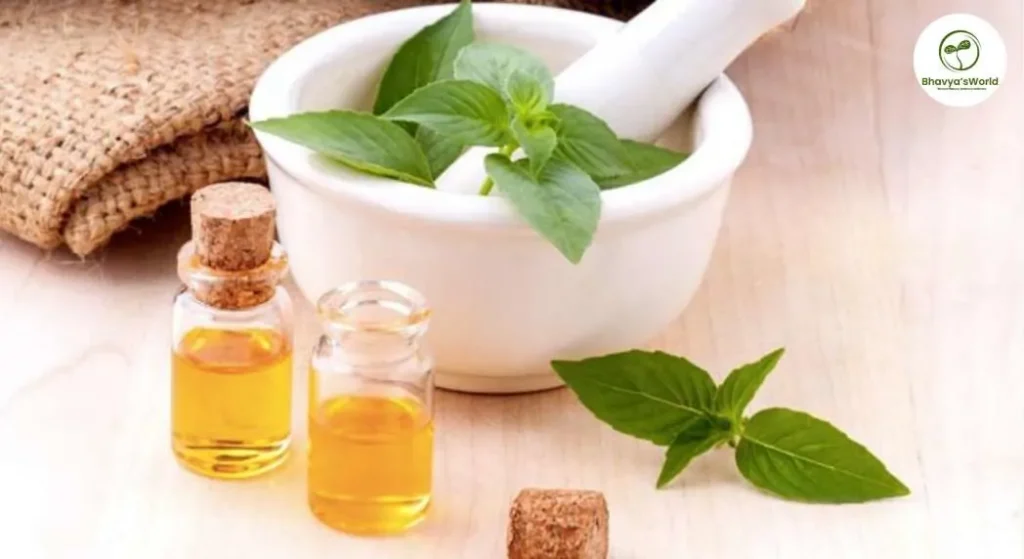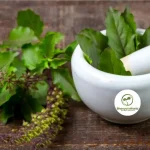Tulsi in Ayurveda is also known as the ‘Queen Of Herbs’ for its medicinal, spiritual, and healing properties.
Indian Traditions are deeply root it, making it very important. Many people consider it the earliest herb that can cure so many issues.Keeping it in the courtyard or near the house and making it easily available for home remedies helps to prevent diseases with its medicinal properties.
Tulsi has so many different names such as Ocimum Tenuiflorum or Holy Basil. Sanskrit derives both Tulsi & Tulasi. People often use words like “God”, “Holy”, “Deity”, and “Divine” to describe this Holy herb. Then you know the plant has some special history.
Why do People Cultivate Tulsi?
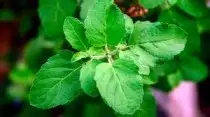
Farmers cultivate Indian basil plants for religious, traditional and medicinal purposes. They produce essential oils that Aromatherapy practitioners use to help improve mood, reduce stress, and tend to increase attentiveness.
Additionally, practitioners commonly use Tulsi in Ayurveda, particularly as herbal tea (Tulsi tea ), and in remedies for colds and coughs.
Significance of Tulsi in Ayurveda

In Ayurveda, practitioners regard Tulsi as the holy plant that possesses therapeutic properties and use it in systems of medicines.
People know holy basil as the Elixir of Life because it has anti-inflammatory, antimicrobial, and adaptogenic properties that make your body healthy and promote longevity and overall health.It focuses on healthy lifestyle practices and consumption of lots of healthy herbs. Tulsi in Ayurveda is regarded as a natural substance that is considered to help the body adapt and cope with stress and improve overall health or you can say Adaptogen.
Role of Tulsi in Ayurveda in Maintaining Balance of ‘Doshas‘

First of all, we should know what the Doshas are? They combine the 5 elements: Air, Fire, Water, Earth and Space.
They influence sleep,digestion and emotions.It can be in excess or not so excess which can really impact the body’s functioning. It can really impact the body function.
According to Ayurveda, There are 3 types of Doshas and Tulsi helps to maintain all these doshas by solving specific imbalances.
| Doshas | What they do? |
| Vata dosha | Tulsi helps to relieve joint pain and promotes relaxation. |
| Pitta dosha | It improves digestion of the stomach. |
| Kapha dosha | It reduces excess mucus and detoxifies the body. |
Tulsi in Ayurveda as Rasayana
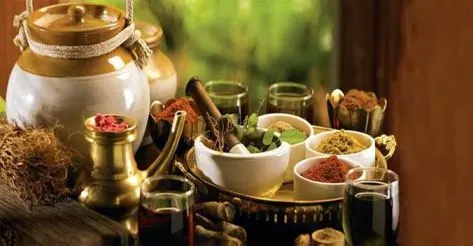
Tulsi in Ayurveda is considered as Rasayana, a group of medicines that use plant parts to make remedies to have a healthy life.
What do Rasayana do to you?
- Improves immunity
- Improves physical health
- Improves cognitive function (eyesight)
- Improves appearance
Benefits of Tulsi in Ayurveda
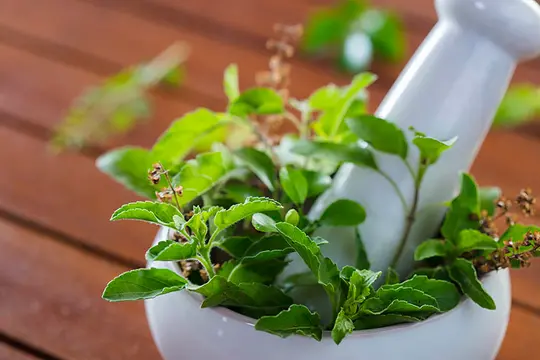
According to Ayurveda, there are so many benefits of Tulsi, which helps people from so many diseases such as treating respiratory issues and digestive problems and many more.
Minimizes Stress and Anxiety
Tulasi in Ayurveda is an adaptogen which means it has a natural compound that helps one’s body to adapt to stress and promotes a proper mental balance.
Enhances Sleep Quality
Tulsi possesses a compound that acts as a natural relaxant that helps treat problems like Insomnia, which eventually leads to better and improved sleep cycles.
Improves Cognitive functioning
Cognitive functioning refers to a mental ability to think, understand, and complete tasks, and Tulsi tends to enhance it.
Detoxification
Tulsi tea helps to detoxify the human body by throwing out toxins and then acts as a natural detoxifier.
Relieves Headache
When people freshly make Tulsi tea, they believe it tends to reduce headaches from its aroma and natural compounds.
Research Supporting Ayurvedic Practices
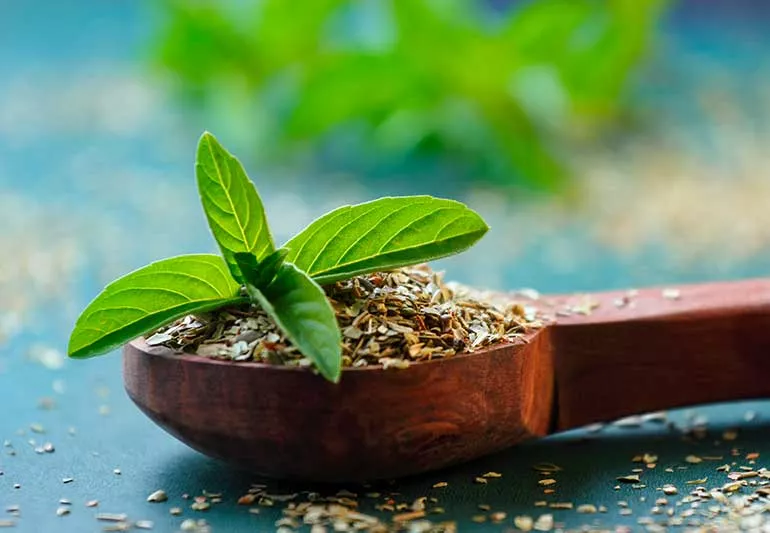
Following are the medicinal uses of Tulsi in Ayurveda
| Properties of Tulsi | Medicinal Uses |
| Antioxidant | Rich antioxidants fill Tulsi drops and leaves,which help to prevent cell damage. |
| Adaptogen | Tulsi in Ayurveda is regarded as a natural substance that is considered to help the body adapt and cope with stress and improve overall health. |
| Antimicrobial | It treats enzymes,psoriasis and many other skin infections. |
| Anti-inflammatory | It helps to manage chronic arthritis and joint pain. |
Types of Tulsi in Ayurveda

Ram Tulsi
Farmers commonly cultivate these Tulsi, which have characteristics like bright green leaves
Krishna Tulsi
These Tulsi are less common and have darker or purple leaves.
Vana Tulsi
People distinguished as wild plants that commonly grow in forests.
There are many more types of tulsi that are grown around the world.
Ayurvedic Tulsi products with Practical Application
There are so many Tulsi products that are used in making tea,skin and hair care and many more.
Herbal Tea
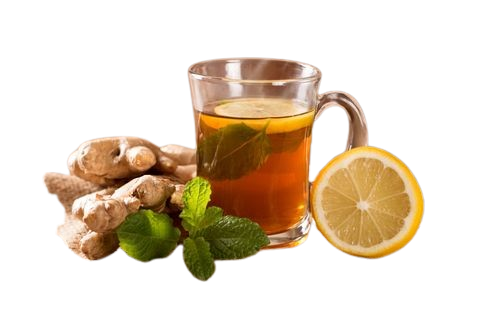
According to Ayurveda, Tulsi tea is an herbal infusion without any caffeine, full of nutrients and antioxidants.
Tulsi Powder
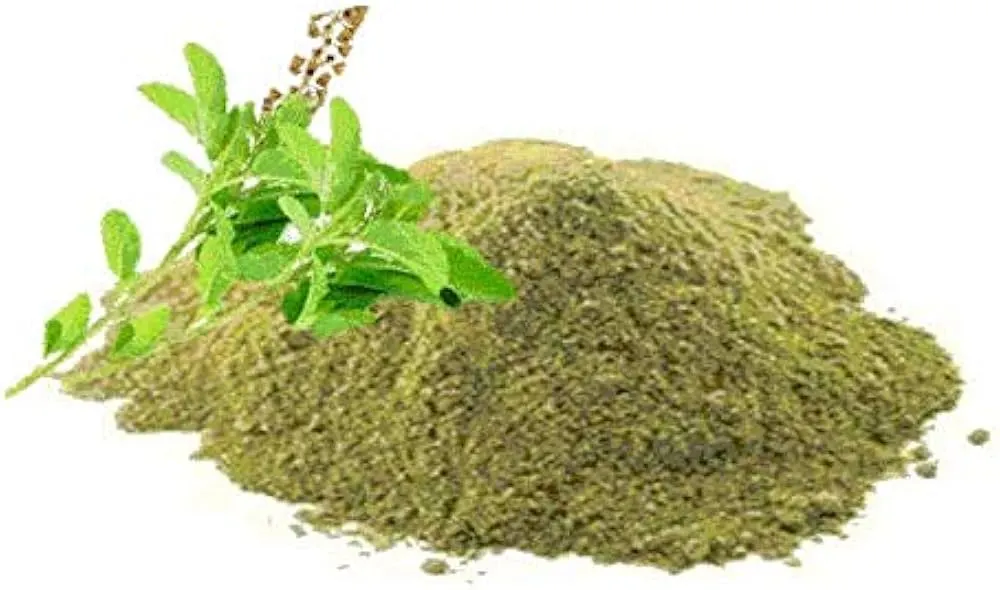
Tulsi leaves are dried up and ground into powder. Then this powder is:
- Used as Face masks ,
- Mixed in smoothies,
- Put in boiling water to help to ease the pain of sore throat.
Tulsi Oils
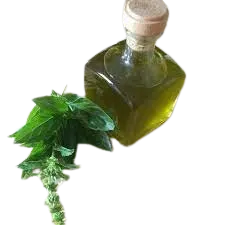
Holy basil oil is extracted from the leaves and then:-
- Used for its antimicrobial and anti-inflammatory properties.
- It is applied to skin infections or other skin issues.
- It is used for Aromatherapy and massages.
- Applied to relieve joint pains.
- It can also be applied when one is suffering from Headache.
Ayurvedic Tulsi Drops
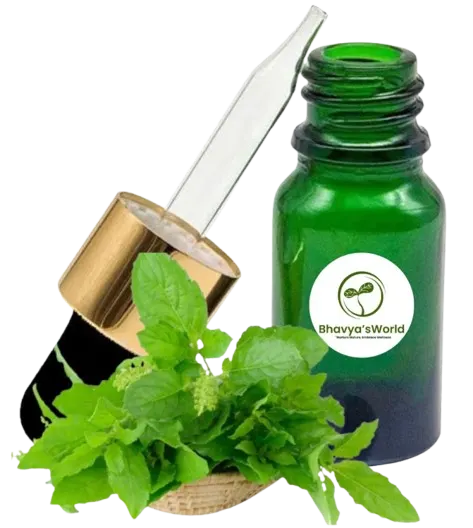
Its drops are put in the eyes for good eyesight.
Origin and Historical Background
Tulsi in Hindu Mythology

Indian culture has highly regarded Tulsi, also known as Ocimum tenuiflorum or Holy Basil or Vrinda for around 5000 years.
They symbolize her as a woman and earthly manifestation of the Goddess Tulasi, who they consider an avatar of Lakshmi (The Goddess of Wealth ) and a great follower of Lord Vishnu/Krishna.
Worships

Lord Vishnu‘s worshippers wear breaded prayer necklaces made from Tulsi stems and Tulsi petals mixed with water, which they give to the dying person so that its souls go to heaven and have peace. They use its leaves are in rituals like Puja , and they often believe that putting Tulsi in water (Tulsi Jal ) purifies one’s mind and body.
Architectural Role

In Hindu houses, people plant tulsi in the centre of the courtyard because of the following reasons.Usually in Traditional Indian homes the courtyard or we can say Aangan is treated as heart of the house and planting the Tulsi there can lead to spiritual practices into daily life.
Connection to Nature
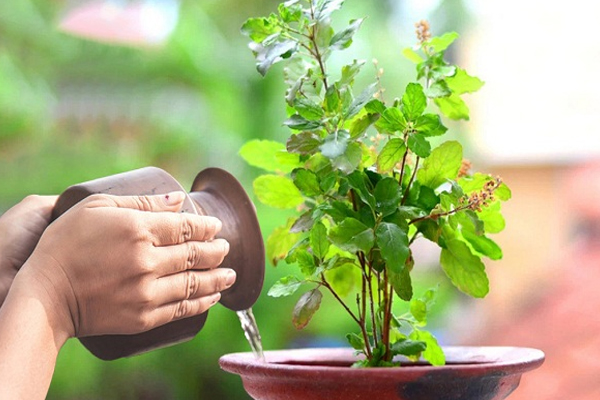
It helps family members to reconnect with nature by watering, worshipping, and taking care of the Tulsi plants, doing some activities of Tulsi plant care as a part of their daily routine.
Comparison Between Tulsi and Basil
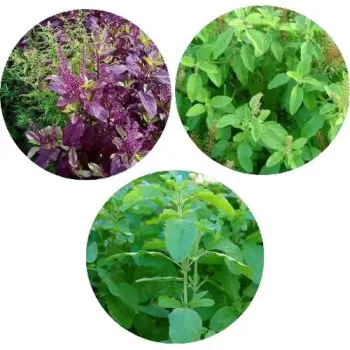
Tulsi is used in the Indian Sub- continent while basil is used in the West (Thailand).If we talk about the difference of tulsi v/s basil then we should know that they both have same starting name which is Ocimum, and both herbs belong to the same family i.e. Lamiaceae which comprises mint plants and culinary herbs like rosemary, oregano, lavender, catnip etc.
Side Effects of Tulsi

Everything when taken in excessive amounts can be harmful to the body and can have side effects.Even though Tulsi has so many benefits and can help with practically every issue a human body may have, there are certain things we should consider before using it.
- Over-consumption Risk: Too much taking of Tulsi in any form (food or medicine) can lead to overdose of Eugenol which eventually causes respiratory issues like fast breathing and vomiting blood while coughing.
- People say that Tulsi contains eugenol that helps to reduce respiratory issues but taking an excess of it will result in poisoning.
- Male Fertility Concerns: It can have a negative effect on male fertility.
- Blood Thinning : Tulsi leads to blood clotting,so individuals on blood thinners should consume it cautiously.
- Risks in pregnancy : Overusing of Tulsi during pregnancy can really harm mother and baby because experts say it may lead to increased uterine contraction that will cause problems during the labours.
Frequently Asked Questions
People also known Tulsi as Holy basil. The word ‘Holy’ reflects is its connection with religious and spiritual significance, while the word ‘Basil’ indicates that it comes from perennial herb and shrub family used as common cooking basil.
They can drink Tulsi tea, if they are feeling stressed and anxious it will help you calm down or can use Tulsi oil to relieve headaches and boil some leaves of tulsi in water and drink it to improve their immunity.
Conclusion
To summarize, people recognize Tulsi for its immense medicinal, religious, and spiritual benefits and refer to it as the ‘Queen Of Herbs’ for its Medicinal, spiritual, and healing properties. It is deeply rooted and holds significant importance in Indian Traditions. Ayurvedic texts clearly state that it helps in balancing Doshas as well as improving immunity and overall health. People who struggle with stress, anxiousness, or have skin and hair issues can drink Tulsi water or use Tulsi oil or Tulsi powder daily to solve all these problems. Any herb can replace the vital role that tulsi plays in Ayurveda
“Tulsi is not just an Ayurvedic herb but also a powerful natural medicine. Read our next blog on Tulsi Medicinal Uses!”
